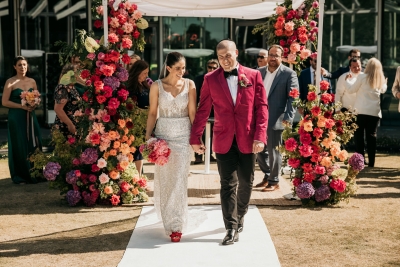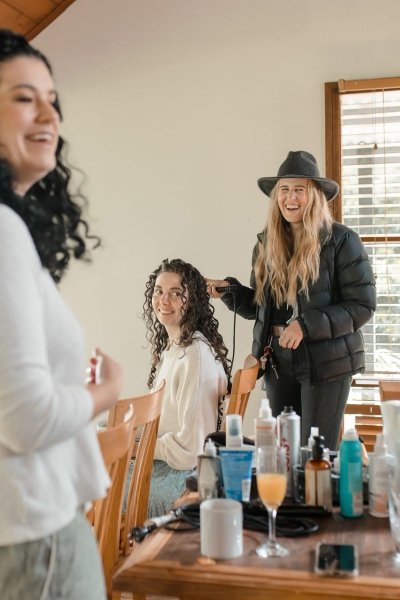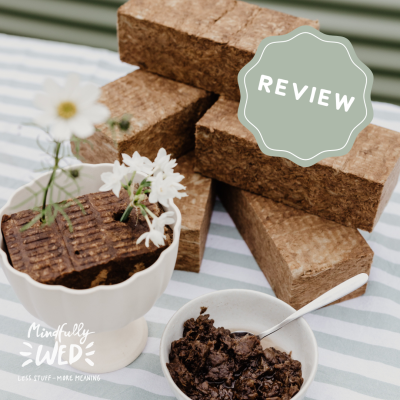Planning a wedding can be exciting, but it can also feel overwhelming—especially if you have ADHD. One minute you’re on cloud nine, and the next, you’re lost in decisions and details. Take a deep breath! Polka Dot Wedding is here to help you every step of the way.
What You’ll Find In This Guide:
- Getting Started: Creating a wedding plan.
- Staying Organised: Tips to manage overwhelm.
- Handling Tasks: Easy ways to keep track of what needs to be done.
- Enjoying Your Day: How to make the most of your wedding day.
Meet Our Experts
- Lucy Archinal-Hudson: Psychologist who supports neurodivergent individuals (and is neurodivergent herself) through psychology, workshops, public speaking and advocacy. Find her at Archwise Psychology. Follow Lucy on Instagram.
- Katrina Shaw: Counsellor and Founder of Grief Talks. Diagnosed with inattentive ADHD two years ago, she is also a newlywed after recently planning a UK destination wedding. Follow Katrina on Instagram.
- Hayley Harris: Mental Health Trainer and advocate with lived experience of ADHD among other mental health challenges. She is engaged and is due to tie the knot in late 2024. Follow Hayley on Instagram.
Photos by Dani Bartlett Photography via Kat & Ben’s Eclectic Garden Party Wedding
1. Getting Started: Creating a wedding plan
Define Your Priorities and Budget
Your first step is to lay a solid foundation for your planning. Lucy explains, “People with ADHD often struggle to consider the long-term impacts of decisions or choices. For example, they might be captivated by a vendor and put down a deposit without considering the overall budget, vision, or plan.”
To combat this, clearly document your “must have” priorities and budget with your partner, whether in a single physical notebook or a digital note. Remember, you really only need 5 things to be married:
- yourself
- your partner
- an authorised celebrant or other officiant (to say, and help you both say, a couple of mandatory statements)
- a notice of intention to marry if you want it to be legal
- two witnesses over 18
Everything else is an optional extra!
Perhaps you and your partner can each choose three elements of your wedding that are the most important to you as individuals. Rank them. And then compare notes to see which overlap. This could really be any number of elements that you like, however, fewer is better to keep you focused and your budget on track.
Any elements that you both have on your list will likely be ranked as the highest priority “wants”. These agreed-upon reference points will guide you throughout the planning process, helping to manage overwhelm and impulsive decisions.
Establish The Basics
Secondly, start thinking about the major elements of your day based on your “wants” and the budget that you agreed upon earlier. These will likely be things like the location or venue, photographer, the style of your wedding and the size. Then, before you book anything, look at your list one-by-one and consider how these major elements might impact you both in planning detail beforehand and on the wedding day.
There are also many wedding checklists online that will help you to make sure you haven’t forgotten anything (keep in mind you don’t need to do everything they say). Find some of ours here.
For instance, would choosing a familiar venue, where everything happens in one place, without the need for transportation to different sites feel more comfortable? Remember, it’s not about planning the perfect day for everyone – it’s about planning a “just right” day for you and your partner.
We don’t recommend trying to get through the whole list in one sitting. Decide to apply this though process to one item a day or several smaller chunks. You should end up with your own highly personalised checklist to help with your decision-making.
Consider Sensory Details
Now that you have a tentative plan, take another look at your list step-by-step and identify potential sensory triggers. Pay attention to:
- Big factors: Guest count, venue acoustics, event duration.
- Small details: Your outfit fabrics, music volume, lighting and scents.
Hayley shares, “to accommodate my sensory needs, I have chosen satin textures throughout the wedding dresses and an outdoor venue with running water.”
Structure Your Day Mindfully
Next, think about timing of the actual day.
- Plan restorative breaks into your timeline.
- Create a “breather” room for private moments – many venues offer these anyway.
- Consider having in that space, or otherwise on hand, things that typically provide you with sensory relief e.g. soothing scents, soft lighting or a comforting, cosy personal item.
- Allow enough transition time between events.
Having supportive friends and family nearby, or an MC or on-the-day coordinator, who have been briefed beforehand on when to step in or slow things down can help to ground you during the day.
Hayley and her partner are accommodating her ADHD in regards to the size of their reception and their schedule. “On the wedding day, we plan to schedule short breaks to regroup and recharge. For example, after the ceremony, my partner and I will take a short breather before greeting guests. This will also help us transition into the next stage of the wedding and will hopefully lead to us being less overwhelmed initially. We also plan to have a very small and intimate reception to allow us to connect with each other and create a more relaxed evening.”
Watch Out For Common Pitfalls
Lucy highlights the “ADHD tax” as a common challenge. “This refers to the financial burden people with ADHD often carry due to their neurotype. For example, having to pay late fees for borrowed hire items that are not returned on time, missing out on early-bird discounts due to not being organised, impulsively buying items that don’t end up being used for the wedding and even paying to replace items that were misplaced/lost”.
To tackle the ADHD tax:
- Set up automatic payment reminders.
- Enlist your partner or an accountable friend or professional planner to help you stay on track.
- When monotonous tasks like emails and invoices pile up, break them into shorter sessions.
- Consider having a long engagement; but with strict deadlines built into your calendar – and give the above accountable person access.
Plan For Joy
Now that you have a personalised action plan for the important and necessary parts of your wedding, take a step back and make sure there is some joy included.
- Is there anything silly, fun, romantic, highly personal or surprising that you’ve always wanted to include in your day?
- Can you adapt things you’re already doing to make them especially meaningful to you as a couple? Add these ideas in where ever budget allows.
Hayley shares, “my focus is on making it as fun and enjoyable as possible. I certainly have a vision in mind for how I would like the wedding to all come together but am just trying to make sure the wedding is what we want. I haven’t felt pressured by anyone in our lives about what the day should or shouldn’t be, so we’ve just been able to have fun with it. My favourite part has been choosing the music and building the day around the music.”
Make The Most Of Your Magic
Your neurodiverse brain brings special strengths.
“So often, ADHD folk chastise themselves for getting distracted or going on tangents when something unplanned has captured their interest (often called ‘side quests’) – this is especially true if this behaviour has gotten them into trouble in the past. However, these things are often the things that you will remember about the wedding planning or the day itself, and the things that will be most special because they are so meaningful and personal,” explains Lucy.
While neurotypical brains thrive on importance, consequences, and long-term objectives, your “interest-based nervous system” is programmed to flourish under conditions that capture your curiosity.
- Don’t shy away from following your interests during planning. Set aside a set amount of time regularly for exploration to dive into topics that excite you.
These unplanned detours often become the most cherished memories, as Lucy experienced when she impulsively decided to handwrite notes to every guest the night before her big day. “About halfway through the guest list, I was frustrated with myself for going down that path,” she recalls. “However, it became an unforgettable highlight that my family still talks about.”
2. Staying Organised: Tips to manage overwhelm
Set Realistic Expectations
The excitement of wedding planning often leads to taking on too much. It’s crucial to set realistic expectations from the start. Consider spreading out deadlines and limiting concurrent tasks. You might need to scale back your original vision by simplifying decor, trimming the guest list, or streamlining certain aspects of the day. Refer back to your must-have “wants” regularly – everything else can go.
Katrina’s experience, along with her partner Will, illustrates the importance of simplification. “After a few ADHD breakdowns, we decided to remove the frills and keep it simple. We added a couple of DIY elements that my brain thrived on and removed anything else that didn’t feel good. In the end, all we added to the venue was a handful of flowers across the tables and a welcome sign. This meant we kept vendors (and the need to manage/maintain communications) and tasks to a minimum.”
Building Your Support Network
- Divide responsibilities and tasks with your partner based on individual strengths.
- Accept offered help from friends and family.
- When asking for help have a frank chat about how much input and effort it’s practical for someone to provide.
Lucy advises, “ADHD people often struggle with rejection sensitivity and can perceive loved ones’ input as criticism. But remind yourself they simply want to support you, not undermine your efforts.”
Being upfront with vendors about your needs can also be beneficial.
Katrina shares, “I often find if you’re upfront and share how you’d like to work together; people are happy to accommodate. If they aren’t, they may not be the vendor for you! A lot of vendors made jokes about how organised we were as we booked them 18-24 months out from the wedding. I was honest with them, in casual conversation, sharing that it helped my ADHD to know that the bigger items were ticked off. I also gave them permission to chase me if I had forgotten to send them something or missed a Zoom call – they were all wonderful, understanding and a few of them are neurodivergent themselves so we could have a little giggle together.”
Family support can be invaluable for detail-oriented tasks. Hayley found this particularly helpful; “I have relied heavily on support from my family and friends. Their support has been invaluable in managing tasks that might be overwhelming and ensuring that all details are attended to. Having a support system in place has helped me stay grounded and reduce the stress of planning.
My sisters have come over to my house for planning days to help me sort through my spreadsheet and check if anything is missing or if anything can be delegated. For example, I kept forgetting to send out the save-the-dates, and when I eventually sent them, I was missing half of the addresses. My sisters talked it through with me and encouraged me to create a Facebook event for the save-the-date to ensure everyone has the information they need, and then to put a post in the event to ask for everyone’s address. Even if it means I have double-ups, at least it will ensure I have everyone’s addresses for both the save-the-date and the wedding invites.”
If your budget allows, hiring a professional wedding planner could be the ideal solution. They can handle details, deadlines and logistics while you focus on the aspects you genuinely enjoy planning. A planner’s expertise also lends crucial accountability to keep you on track.
Build An Amazing Vendor Team
Vendor meetings can be daunting, but preparation can alleviate stress. Lucy recommends creating a list of key points and questions beforehand to maintain focus. Addressing communication preferences is also crucial. “Let vendors know about your communication preferences. Maybe you prefer visuals/photos to paint a picture of what they can offer, or maybe you prefer to be taken through it verbally. It is okay to ask for different forms of communication that suit your needs.”
For decision-making challenges, Lucy suggests, “If you need more time to weigh your options, ask for more time to make decisions, and don’t feel pressured to decide on the spot.” She also advises requesting breaks during lengthy planning events if needed.
Hayley offers a tech-savvy tip: “If you are overwhelmed with scheduling meetings, set up a Calendly profile and connect it to your calendar. This way, other people can check your schedule to see when you’re free and book a time, which will then automatically be sent to everyone’s calendars.”
Schedule Breaks & Time For Self Care
Amid the whirlwind of planning, it’s vital to prioritise self-care. This includes meeting basic needs like adequate sleep, nutrition, hydration, and exercise, as well as scheduling intentional breaks.
Katrina, who balanced wedding planning with fertility treatments, shares, “There were periods where I decided not to do anything wedding-related because it felt too much. At other times, however, it provided me with a welcome distraction and something else to hyper-focus on. I was aware that the last few months before a wedding can become busy and intentionally planned check-ins with my psychologist and support network throughout this time.”
Lucy emphasises the importance of planned breaks. “Schedule breaks or even a wedding planning-free weekend. If time-off is planned, you can often enjoy it more, rather than seeing it as procrastination and ruminating the whole time during the ‘break,’ making it not a break at all!” And don’t forget to use the tools of emotional regulation techniques to help you cope. “Breathing, imagery, sensory activities, mental distraction games, and grounding exercises are things you can use in the moment to regulate your nervous system and calm big emotions.”
Celebrate Achievements (And Each Other!!)
Lucy encourages couples to recognise each other’s strengths. “Take time to reflect each other’s strengths back to one another – maybe your partner has demonstrated generosity with their future in-laws, or shown consideration for others who are travelling from far away, or another character strength during the wedding planning process. Reflect this back to them, which will foster a sense of connection, teamwork, and validation.”
3. Handling Tasks: Easy ways to keep track of what needs to be done
Delegate And Get Clever With Tasks
We already talked about asking for help. But how do you figure out what to ask for help with?
Lucy has three key tips to help!
- Delegate tasks that you will know will be a challenge (such as those that are repetitive, or monotonous). If they can’t be delegated, then it can be helpful to bring someone along with you or to work beside someone as they are also working – this is called body doubling.
- Keep the tasks you enjoy or the tasks you find engaging. These might be tasks that align with your creative hobbies, or your strengths. Also, starting with a task you enjoy first can often give you a sense of achievement and pride, which can be a boost of motivation to keep going.
- Set up a ‘delegation deadline’ – if there is a task you want to do yourself, but there is a risk of procrastination, agree with your loved one that if you haven’t done it by x date then you will pass it over to them. If you struggle to delegate or you feel like a burden in doing so, this can be a good compromise.
Katrina enlisted the help of her partner Will and her wedding party to keep her accountable for tasks she didn’t enjoy. “I was very fortunate that my in-laws and bridesmaids offered to help, given they were in the UK. Will also participated equally in the planning process. I was able to assign some of the less ADHD-friendly tasks to others, whilst I focused on the parts I knew I’d thrive in. They also gently supported me when I felt overwhelmed or became overly enthusiastic about a new idea.”
Hayley built her own system. “Initially, I searched for suitable spreadsheets online that were formatted in a way I liked, then I organised all of the big-picture details before breaking them down into smaller, manageable steps with due dates and checkboxes. I’ve paid deposits as soon as they come in and, where possible, paid the full amount to reduce the mental load down the track. As we get closer to the wedding day, I’m allocating specific times for wedding planning to avoid burnout and maintain a balanced routine. Chatting regularly with my fiancé and delegating tasks to one another, as well as meeting with supportive people who help me body double and talk through overwhelming tasks, have been key strategies.”
Create NICE Conditions
Lucy explains, “The ADHD brain works best under “NICE” conditions – N for novelty, I for interesting, C for challenging/competitive, and E for emergency/external accountability.” Lucy suggests ways you can create ‘NICE’ conditions:
- Make it new/novel. Change where you do your planning. If you usually plan from your home office, try mixing it up by going to a café or a friend’s house. Even something as simple as changing the colour of the folder that you store all your notes in can inject some novelty and bring back the motivation!
- Make it competitive. Use the power of countdowns, racing against the clock, or winning against another person to add an element of gamification and fun. Think about how motivated you are to get as many little things done as you can before the microwave timer goes off! Ways you could do this include racing against your partner to stuff as many invitation envelopes as possible or making a leaderboard recording many items you have ticked off your to-do list.
- Make it urgent. Set yourself deadlines, but crucially these need to be shared with other people to keep you motivated to meet them. Ask your vendors for a deadline, and stick to it. It is easy to feel like there is only one big deadline when planning a wedding (the big day itself) so ensure you know what things are due when. A firm date is easier to stick to than relying on just getting it done without any sense of urgency.
Make The Most Of Checklists, Software and Tools
Find tools that work for you. Lucy recommends utilising checklists, visuals, reminders and alerts to ensure those tasks are completed and not out of sight or out of mind. “Reminders work best when they vary in format – such as calendar alerts, physical post-it notes, notes on the fridge etc. Otherwise, they become a bit like the snooze button (very easy to ignore).”
Katrina found spreadsheets were her golden ticket, and made copious notes, “I created a spreadsheet from day one of all the tasks we needed to do, to help me break down tasks into timelines, manage spending (hello impulse buying!) and give me that ever helpful dopamine boost when I ticked something off. Although I often forgot to check the spreadsheet myself, Will supported me in regularly creating time for us to sit down and go through it together. Whenever I had a ‘wild idea’, I’d note it down and come back to it later to see if it was something I actually wanted or if I was excited in the moment.”
Meanwhile, Hayley loves her system of folders that she will carry through to the wedding day. “I plan to create detailed folders with all the necessary wedding information to help reduce the likelihood that I get overwhelmed on the day so that I can refer people to the folders. Having over a year to plan the wedding has helped build in buffers for when my ADHD brain needs something novel for some time.”
Get Scheduling
Lucy says the best way to tackle that seemingly endless list of tasks is to make appointments with yourself. “Bring wedding planning out of the ‘not now’ mode and into the ‘now’ mode by scheduling appointments with yourself. Decide when you will complete the tasks – maybe this is every Sunday at 10 am. Put this in your calendar and keep this appointment with yourself, like you would keep an appointment with a friend or colleague.”
Batch and Break Down Tasks
If you find yourself feeling drained from constantly switching between different types of tasks, try batching similar activities together. Dedicate specific blocks of time to completing related tasks in one sitting. For example, schedule all venue site tours on the same day or set aside a few hours to send out your initial vendor inquiry emails. “Batching tasks together means you can stay focused and you aren’t stopping/starting (this is especially useful as starting is often the hardest part),” explains Lucy.
When you’re feeling overwhelmed by larger tasks, breaking them down into smaller, more manageable steps can also provide relief. Chunking extensive to-do’s into bite-sized pieces makes them feel less daunting and more approachable. “Bonus points if you create a list you can check off,” recommends Lucy. “Checklists are helpful as they are a visual prompt, as well as provide a sense of achievement and satisfaction when you tick something off.”
4. Enjoying Your Day: How to make the most of your wedding
Assign A Timekeeper
Assign someone organised and reliable (a hired wedding planner or a trusted friend/family member) to keep you on schedule. From the moment you need to be ready, to when you get out the door, to the end of the photo session, have them keep a close eye on the clock and gently guide you through each event. This will help reduce anxiety about losing track of time and missing important moments.
If this feels like too much of a task to give to a single person, assign a few different people to different periods of the day. If not using a professional, the most practical candidates may be those in your entourage (e.g. best man or maid of honour) as they will be with you nearly all day.
Assign A Point Person
In addition to a timekeeper, designate a point person (could be the same trustworthy individual) who can handle any issues or coordination needs that arise during the day. Give them clear instructions beforehand about when it’s ok to increase the budget on the spot; upping the bar tab, for example, or extending into overtime with your reception venue. This person should be someone level-headed who is likely to stay relatively sober on the day and not need to come to you with every little thing. Let your vendors know to go to them first before you.
This allows you to stay present and enjoy the moment, knowing someone reliable is taking care of logistics. If you have the capacity, a professional wedding planner or on-the-day coordinator would be golden here!
Manage Overwhelm
Identify your triggers for overwhelm ahead of time. This might mean scheduling alone time with your partner (with or without your photographer), skipping a receiving line, or making use of quiet spaces during a packed dance floor. Discuss options with your partner and wedding party so they can support you in avoiding overstimulation.
If you don’t want to feel “dramatic” or draw attention, maybe even have a safe word – make it something fun – that your partner, planner and best person know. It’s shorthand for; “I have to take a quick time out, no questions asked, please get me/let me go to the quiet place.” And they should know your preference that they either come with you for company or run logistics or entertain guests without you for a little while.
Don’t hesitate to use this safe word before you really need it. Practice it with your partner beforehand – you both can say it – no doubt there will be time during the planning that it will come in handy!
Advocate For Your Needs
Be clear about what you need to make your wedding day work for you. Don’t be afraid to advocate for yourself and your needs, whether it’s cutting the photo session short, delaying the schedule for a break, or preferring a private ceremony before a more public reception. Communicate openly with vendors and loved ones.
Hayley has been thrilled with her choice of vendors and their accommodations. “We have been so lucky to have amazing vendors come on board. They have all been really clear with their communication and are sending out meeting invitations and information as needed. So far, we haven’t had any problems with our vendors, and they have been very ADHD-friendly. I would advise ADHD couples to be upfront about their needs and any specific challenges they face. Creating detailed briefs, having regular check-ins, and confirming details in writing can help ensure that vendors understand and meet your expectations. Don’t hesitate to ask for accommodations or adjustments that make the planning process smoother for you.
–
Finally, now that you’ve read this guide, take a break and let things sink in. Then, come back to it later for a re-read with your partner, while writing down any strategies or ideas (in your all-important notebook or digital file) that you believe will work for you both.
Remember, as long as the two of you are feeling good, the rest is really just icing on the wedding cake!














Join the conversation